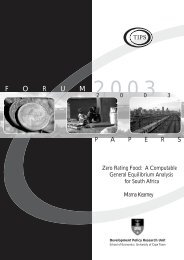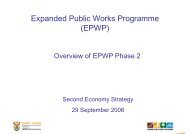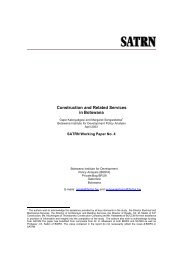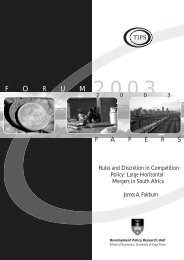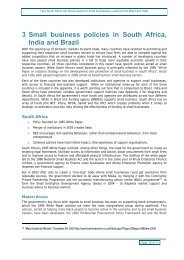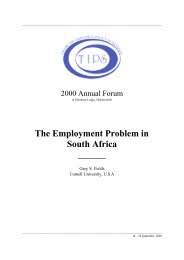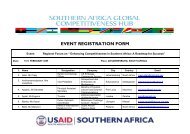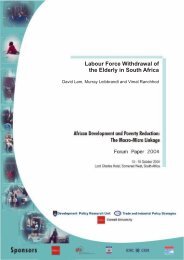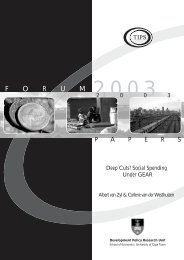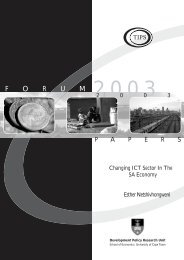(AsgiSA) Annual Report 2008 - South African Government Information
(AsgiSA) Annual Report 2008 - South African Government Information
(AsgiSA) Annual Report 2008 - South African Government Information
Create successful ePaper yourself
Turn your PDF publications into a flip-book with our unique Google optimized e-Paper software.
Accelerated and Shared Growth Initiative for <strong>South</strong> Africa<br />
ANNUAL REPORT<br />
<strong>2008</strong><br />
To capitalise on these opportunities, the <strong>Government</strong> Support and Assistance Programme and its components<br />
should be aligned and a special-purpose vehicle must be created to drive investment attraction<br />
and skills development.<br />
In biofuels, the Department of Minerals and Energy published licensing criteria for producers. Two solid<br />
biofuel plants were established, producing wood granules as coal replacements for the export market.<br />
In addition, planning was completed for a R2-billion plant in the Eastern Cape, which would process local<br />
canola into bio-diesel for export to Europe. The plant formed part of a much larger agrarian reform<br />
project in the Eastern Cape, which if successful, would improve livelihoods for half a million smallholders<br />
in the former Transkei and Ciskei.<br />
Early in 2009, Cabinet approved a beneficiation strategy for minerals. The strategy identifies the scope<br />
of minerals refining and manufacture, increasing local value added and technical capacity as well as<br />
creating more employment. The next steps require more in-depth analysis of possible projects in mining’s<br />
priority subsectors. At the same time, the mining industry as a whole, but particularly platinum,<br />
diamonds and steel, faced a fall in world prices from mid-<strong>2008</strong>, leading to extensive layoffs and declining<br />
returns.<br />
In addition to the beneficiation strategy, the National Foundry Technology Network became fully operational<br />
in <strong>2008</strong>. Some 17 companies were benchmarked and technology upgrading commenced. The<br />
National Tooling Initiative also began upgrading programmes. A jewellery incubator was established at<br />
Gold Zone in Germiston, Gauteng, to address training and SMME development. Finally, the department<br />
engaged extensively with National Treasury on the desirability and practicality of measures to incentivise<br />
the retention of scrap metals in <strong>South</strong> Africa for local beneficiation.<br />
The revised support programme for the auto industry was announced, with an investment allowance<br />
to be introduced from October 2009. As of March 2009, the dti was exploring the possibility of fasttracking<br />
and/or modifying some incentives to provide support for the auto components industry. The<br />
sector faced unusually severe difficulties as the global downturn led to a sharp drop in both domestic<br />
and foreign demand for cars.<br />
65



